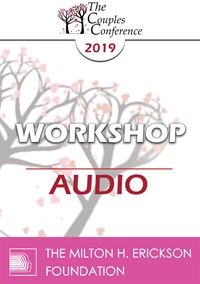CC19 Workshop 11 - Introduction to a Psychobiological Approach to Couple Therapy – Continued - Stan Tatkin, PsyD, LMFT
Credit Available - See Credits tab below.
Total Credits: 2.0 including 2.0 A.P.A.
- Average Rating:
- Not yet rated
- Topic Areas:
- Workshops | Psychobiological Approach to Couples Therapy (PACT) | Continuing Education | Couples Therapy
- Bundle(s):
- CC19 Main Conference Audio Bundle | CC19 Individual Selections
- Categories:
- Couples Conference | Couples Conference 2019 | Online Continuing Education | Pioneers in Couples and Family Therapy
- Faculty:
- Stan Tatkin, PsyD, MFT
- Duration:
- 2:03:44
- Format:
- Audio Only
- Original Program Date:
- Apr 13, 2019
- License:
- Never Expires.
Description
Description: PACT integrates attachment, neuroscience, and arousal regulation to treat complex relational dynamics. This workshop trains clinicians to identify somatic cues, use strategic interventions, and guide partners toward secure functioning. Through cross-tracking, staging, and deep data gathering, therapists learn to assess attachment, manage betrayal, and foster real-time collaboration—even in high-conflict or avoidant couples.
Syllabus Description: PACT is a non-linear, poly-theoretical approach that fuse theories of attachment, developmental neuroscience, and arousal regulation. PACT is quickly gaining a reputation for effectively treating couples typically thought of as challenging.
This two-part workshop will introduce attendees to this psychobiological model, the forensic-like techniques employed to obtain information rapidly, the skills required to quickly read and assess microexpressions and micromovements and other somatic signalling, the use of creative and sometimes outrageous interventions, how to regulate difficult partners and couples as well as oneself, how to identify and work with various presentations of insecure attachment, how to differentiate psychological defenses from neurological deficits, how to recognize and deal with partner acting out, how to get partners into a light trance, how to determine attachment organization through interview and finding somatic markers, how to work strategically and improvisationally, and how to guide partners toward secure functioning. This approach is highly effective, not for the faint of heart, yet exceeding fun! Clinical video and live demonstrations included.
Educational Objectives:
*Sessions may be edited for content and to preserve confidentiality*
- Describe three deceptive behaviors commonly seen in couple therapy.
- Apply the beginning technique for getting partners into a light trance.
- Detect acting out behavior when it occurs and be able to apply at least two interventions for stopping it.
Credits
2.0 credits available.
The Milton H. Erickson Foundation, Inc. is approved by the American Psychological Association to sponsor continuing education for psychologists. The Milton H. Erickson Foundation, Inc. maintains responsibility for this program and its content.
THE MILTON H. ERICKSON FOUNDATION Policy on Disclosure
The Milton H. Erickson Foundation is proud of the conferences and other
educational opportunities it sponsors, taking care that the conduct of
these activities conforms to the standards and principles of behavioral
and medical sciences, thus ensuring balance, independence, objectivity
and scientific rigor in all individually sponsored or jointly sponsored educational
activities.
All faculty members participating in a sponsored activity, and those who
review and therefore are in control of content, are requested to disclose
any relevant financial relationship prior to the CME activity, including but
not limited to specific commercial interests, financial remuneration received
by faculty member or spouse, and what role or activity was performed
for this remuneration. If a conflict of interest exists as a result of
a financial relationship it will be resolved prior to the activity. A faculty
member will not be allowed to present if the conflict is not or cannot be
resolved.
Handouts
| Stan Tatkin - Neuroscience Behind Doing the Right Thing (740.3 KB) | Available after Purchase | ||
| Stan Tatkin - 2 Theories (530 KB) | Available after Purchase | ||
| Stan Tatkin - PACT and Personality Disorders (676.2 KB) | Available after Purchase | ||
| Stan Tatkin - PACT Intro 1 (887.3 KB) | Available after Purchase | ||
| Stan Tatkin - PACT Intro 2 (730.3 KB) | Available after Purchase | ||
| Ericksonian Learning Snapshot (248.3 KB) | 2 Pages | Available after Purchase |
Faculty

Stan Tatkin, PsyD, MFT Related Seminars and Products
Stan Tatkin, PsyD, MFT, is a clinician, researcher, teacher, and developer of A Psychobiological Approach to Couple Therapy (PACT®). He has a clinical practice in Calabasas, CA, where he has specialized for the last 15 years in working with couples and individuals who wish to be in relationships. He and his wife, Tracey Boldemann-Tatkin, developed the PACT Institute for the purpose of training other psychotherapists to use this method in their clinical practice.


